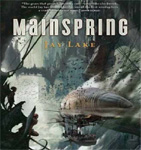
 I Am Legend
I Am Legend
By Richard Matheson; Read by Robertson Dean and Yuri Rasovsky
10 CDs – Approx. 11 Hours [UNABRIDGED]
Publisher: Blackstone Audio
Published: 2007
ISBN: 9781433203299
Themes: / Science Fiction / Horror / Vampires / Noir / Science /
“Come out Neville!”
Would it be fair to say that I Am Legend is one of the greatest novels of the 20th century? No, I personally wouldn’t argue that. I’d argue that instead it is one of the greatest novels of all time. The very first review on SFFaudio was an out of print audiobook from Books On Tape. I bought it on eBay in 2003, I haven’t seen it for sale since. It was a “double novel” audiobook entitled I Am Legend / The Shrinking Man two of Richard Matheson most famous works. As I said in that review, “I Am Legend is one of the best audiobooks I’ve ever listened to.” That same recommendation goes for this edition. The novel alone is worth killing for. If you’re a fan of Matheson, the included short story collection is a bonus.
I Am Legend is a classic vampire story with the standard man against nature, man against himself themes. It is the psychological journey, of Robert Neville, is the very last man on Earth. Every night male vampires pelt his suburban Los Angeles home with rocks and the female vampires expose their nakedness to him – these, his former neighbors – lust for his blood. During daylight hours, Neville repairs the damage to his home, restocks his larder, and his bar, with canned foods, and whiskey. He needs the whiskey, for his other tasks are to suppress the lustful desires he has. He has a deadly lonliness within him. He’s found the only way to keep himself from going mad is to keep busy, drink heavily and try not to think about what’s happening outside his home at night. Since the plague hit, and his wife died, Neville has had to learn the lathe, for turning stakes, and become a microbiologist – he’s used all sorts of techniques to keep the vampires at bay – and he’s curious as to why some work and some don’t. Garlic works, but mirrors don’t. Holy water doesn’t, but crosses do, at least sometimes. It’s enough of a puzzle to turn an everyman into an experimental scientist – and that journey of science, and the lessons of about the world Neville learns along the way are rewarded in what I can only describe as the best ending to a novel ever.
Some will argue that I Am Legend is one of the greatest novels of the 20th century. I’d argue that it is one of the greatest novels of all time. But that said, I’d still argue that Richard Matheson is a very limited writer. He can’t seem to tell more than one kind of story. As I learned from the ten short stories that round out the later discs of this audiobook, (and my previous experience reading The Shrinking Man), breadth of storytelling is not Matheson’s strength. His strength in I Am Legend is the perfect storm of the “psychology,” “science fiction”, and “noir.” In his other works Matheson doesn’t hold all three, (or any other two) in such a perfect molecular bond. The elements that make up I Am Legend play-out absolutely perfectly. But in the later horror stories of this collection, written between the early 1950s and the late 1980s the psychological element is always present, but that’s about all. Stories included are:
“Buried Talents,” “The Near Departed,” “Prey,” “Witch War,” “Dance of the Dead,” “Dress of White Silk,” “Mad House,” “The Funeral,” “From Shadowed Places,” “Person to Person.”
The premises in these tales are all drowned out by the continuing theme of ‘solitary psychology’, repetitions of ‘solitude and isolation’ in everymen, becomes wearisome and frankly boring. I found my mind wandering off in nearly every short story. None held my attention very well. There was one story about a house haunted by an angry writer “Mad House“, and that was an interesting premise, but it didn’t pay off. Another, about an everyman’s visit to a witch-doctor sounded interesting, but then it made me sleepy. The final story in the collection, “Person To Person,” started off very promisingly. An everyman is woken up by a telephone ringing late at night. But the ringing doesn’t stop when he picks up the phone. He consults doctors about this ringing, found only in his head, but there is no medical reason why it should happen. Soon thereafter, a psychiatrist suggest he try to stop the ringing by visualizing the act of answering a phone in his head. Lo and behold this works, and on the other end of the line is a man claiming to be from a top secret government agency! They are conducting telepathy trials – or at least that’s what the voice says. Unfortunately, the premise then is completely overwhelmed by that same recurrent theme: Psychology, psychology, psychology. Is the man crazy? Is it a mad scientist? Sadly you won’t care. These stories all disappoint. As a booster of short fiction I find myself surprised to be writing this – just forget about these short stories, the novel alone will provide more than enough value. But on the other hand, fans of Matheson’s short work should take note that the short stories are not included in the audible.com and iTunes versions. All ten short stories are exclusive to the CD and MP3-CD hard copies available through Blackstone Audiobooks.
Narrators Robertson Dean and Yuri Rasovsky split duty on this collection. Dean reads the novel and Rasovsky the short stories. Dean has a deep voice, and paints effective emotion in what is essentially a straight reading. I think I still prefer Walter Lawrence’s version (out of print) but this is a good reading. Rasovsky, on the other hand, injects a ferocity into the emotions of Matheson’s characters, his voice is raspy, almost scarred. Unfortunately the stories were not engaging, this despite Rasovsky’s best efforts. Blackstone has outfitted the audiobook with a dark out of focus cover that depicts a silhouette of a man walking a lonely street in the big city. Meh. Finally, I saw the latest movie version recently, I had low expectations so I was happy to see it was pretty good. I bring this up because, I think it important to note that the “Legend” of Robert Neville is a legend for an entirely different group in the book than in this film version. That is to say, if you only watched the movie, listen to the novel – it has a big surprise in store.
Posted by Jesse Willis

 My mother’s so hip she not only knows what a podcast is, she’s recommending them! She just sent me an email regarding one of the podcasts she recently listened to. My mom recommends:
My mother’s so hip she not only knows what a podcast is, she’s recommending them! She just sent me an email regarding one of the podcasts she recently listened to. My mom recommends:




